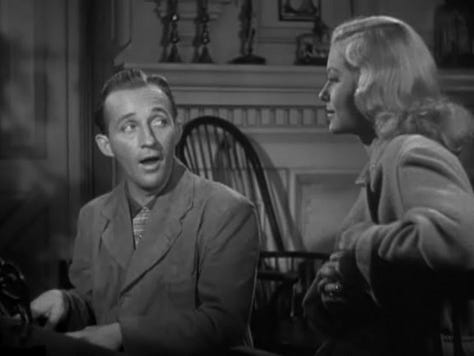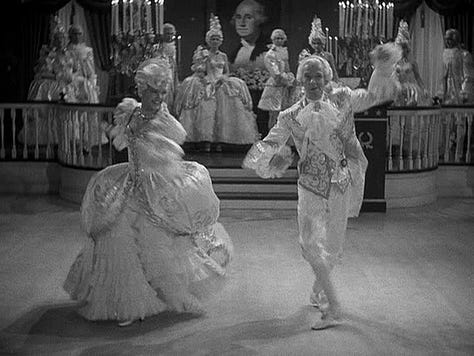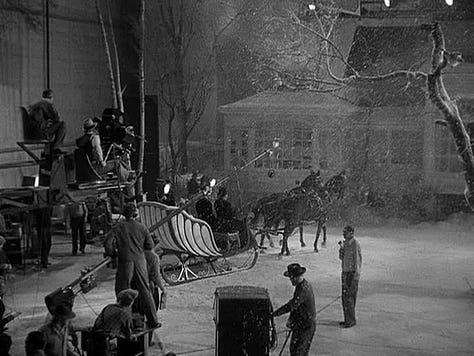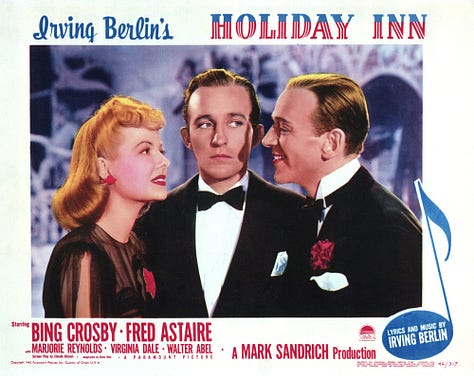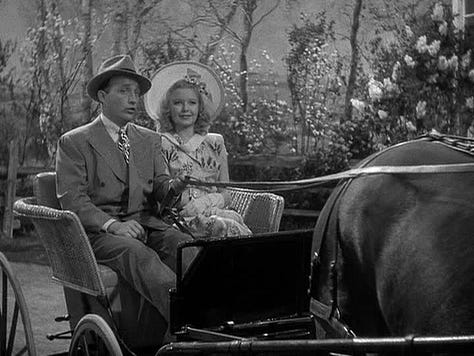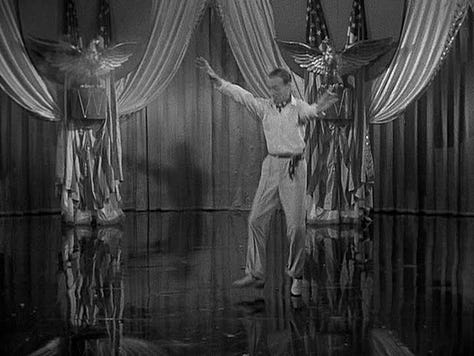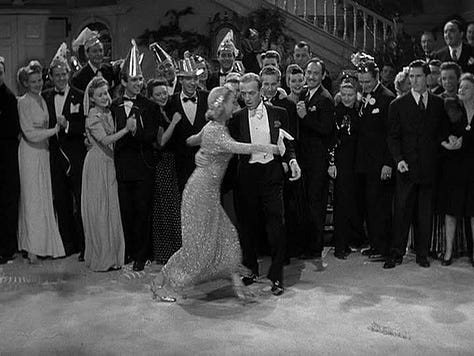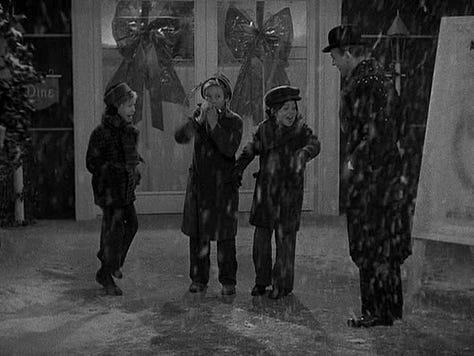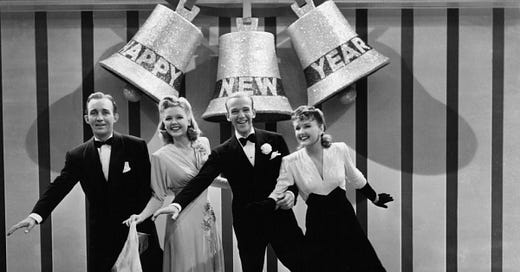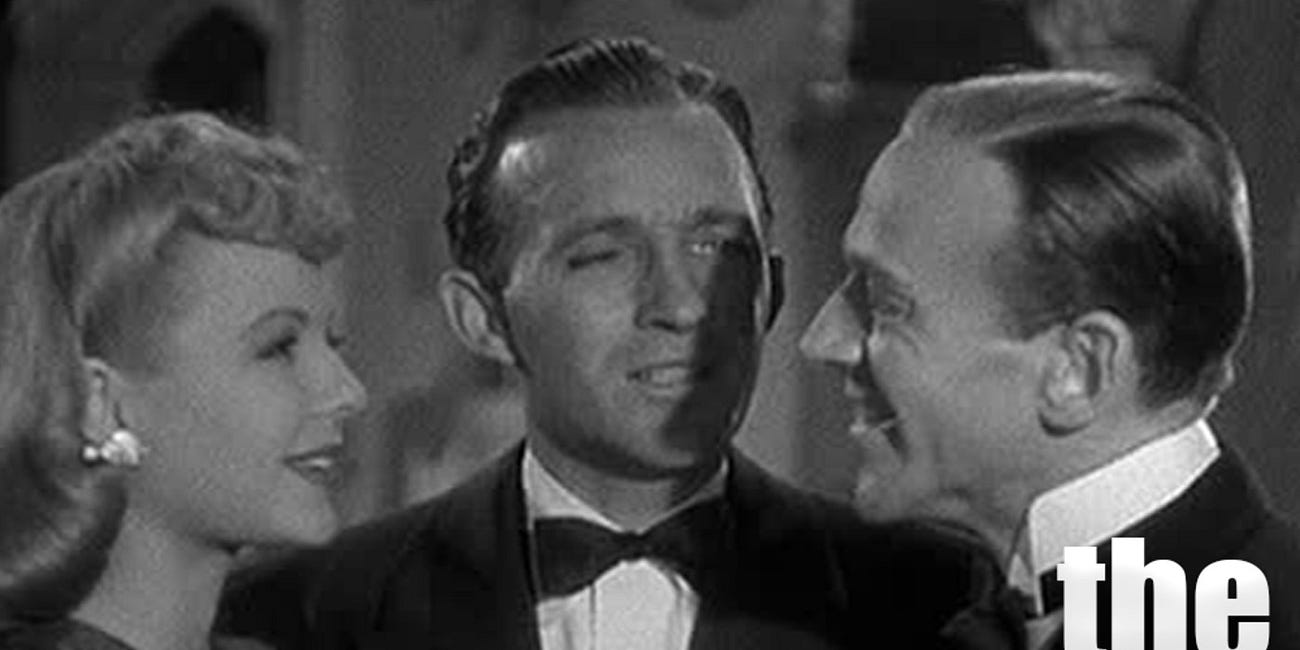HOLIDAY INN
1942 • Mark SandrichCast: Bing Crosby, Fred Astaire, Marjorie Reynolds, Virginia Dale, Walter Abel, Louise Beavers, Irving Bacon, Leon Belasco, Marek Windheim, James Bell
Screenplay: Claude Binyon, Elmer Rice; Story by Irving Berlin
Cinematography: David Abel
Music: Irving Berlin
Producer: Mark Sandrich
Paramount Pictures
- Open holidays only? Say, how many of them are there?
- About 15. That gives me 350 days to kick around in!
- You would think of that!
The movie that gave birth to not just one of the most popular Christmas songs of all time, but one of the most popular songs EVER. More on that in a second. Holiday Inn follows song-and-dance entertainers Jim Hardy and Ted Hanover (Bing Crosby and Fred Astaire respectively) as they compete for the affection of the same girl. Jim has reason to be nervous as Ted has stolen one of his girls in the past. Jim quits show business to run a hotel that is only open on holidays and hires Linda Mason (Marjorie Reynolds) as a performer. When Ted realizes that not only is Linda beautiful, but an amazing singer and dancer he schemes to once again steal a girl away from Jim. The story takes place over a year, with big musical numbers accompanying each holiday celebration.
Bing Crosby was one of the most popular entertainers of his day, so Paramount Pictures gave him a huge budget to do a musical. What does he spend the money on? Hiring the legendary danceman Fred Astaire as his co-star and Irving Berlin as his songwriter they produce one of the most charming musicals ever made. The sizable budget not only facilitated the hiring of these iconic talents but also allowed for lavish set designs, intricate choreography, and top-tier production values. The result was an enchanting holiday musical classic.
While Bing Crosby is often celebrated for his velvety voice and crooning prowess, his comedic acting skills are sometimes overlooked. Even though he had a string of successful comedy films alongside Bob Hope in the Road To… films, his comic acting chops don’t get the respect they deserve. In Holiday Inn, Crosby's comedic timing and affable charm are brought to the forefront. Teaming up with the Fred Astaire, a pretty good comic actor as well, Crosby's comedic talents find an ideal counterpart in Astaire's own charismatic and suave demeanor. The dynamic between the two creates a delightfully antagonistic energy. Crosby's knack for humor is especially evident in the banter and not-so-friendly competition between his character, Jim Hardy, and Astaire's Ted Hanover as they vie for the affections of Marjorie Reynolds’ Linda Mason. Crosby's ability to transition seamlessly between the heartfelt and the humorous showcases what a versatile performer he was.
Each musical number is a delightful celebration of the corresponding holiday, showcasing Bing Crosby's exceptional vocal talent, Astaire’s dancing, or depending on the song, both. "You're Easy to Dance With" and "I'll Capture Your Heart" open the film, with Bing Crosby, accompanied by Astaire and Virginia Dale. These songs showcase the unique talents of the performers before the story moves to the countryside of the Inn. "Happy Holiday" (December) serves as the Inn’s first opening number, this festive tune sets the tone for the rest of the film. It creates a cheerful atmosphere, inviting audiences into the Inn. It’s also become its own holiday standard through the years. "Let's Start the New Year Right" (New Year's Eve) is a joyous and optimistic celebration. "Be Careful, It's My Heart" (Valentine's Day) Bing Crosby's crooning tries to takes center stage in this romantic ballad, but Astaire’s Hanover steals the spotlight out from under him as he puts on a beautiful dancing performance with Reynolds. Bing Crosby & Marjorie Reynolds's smooth rendition of "Easter Parade" (April) adds a touch of elegance to the film. "Song of Freedom" (Independence Day) is a spirited patriotic number, a rousing anthem that embodies the pride and freedom associated with the Fourth of July, and probably a much-needed morale booster as the U.S. was entrenched in World War II at the time. This is followed by an amazing tap dance number by Astaire where he duets with fireworks going off on-stage. However, the true showstopper and enduring classic is undeniably "White Christmas." Introduced in the Christmas segment of the film, this Irving Berlin masterpiece is delivered with heartfelt sincerity by Bing Crosby. The poignant lyrics, coupled with Crosby's emotive rendition, have made it one of the most beloved and recognizable holiday songs of all time. Its enduring popularity extends far beyond the film, solidifying its place in the cultural zeitgeist and earning its status as a timeless Christmas anthem. It’s obviously one of, if not the, biggest song of all time, in any genre, and the title was used for the 1954 musical White Christmas 12 years later.
Holiday Inn is undoubtedly a classic musical that has left an indelible mark on the genre, but it's important to acknowledge that, like many films of its era, it reflects the prevailing attitudes and norms of the time. One notable aspect that has drawn criticism in retrospect is the "Abraham" number, where Bing Crosby and Marjorie Reynolds' characters perform in blackface during the Lincoln's Birthday segment. In 1942, the use of blackface was unfortunately not uncommon in entertainment, and societal awareness of its racial insensitivity was not as heightened as it is today. While the intent may not have been malicious, the portrayal is now rightfully regarded as offensive and perpetuating harmful racial stereotypes. Skipping past the "Abraham" number may be a choice for viewers who find it uncomfortable or offensive, but it's equally crucial to address it within the historical context of the film. Ignoring or censoring such instances in classic films risks erasing an uncomfortable truth about the past. By acknowledging and discussing these elements, we can gain a deeper understanding of how attitudes have changed over time and foster a commitment to promoting inclusivity and understanding in storytelling.
In the spirit of preserving historical accuracy and learning from the mistakes of the past, it's essential to keep these moments uncensored to confront the uncomfortable realities of the time. This approach allows audiences to engage critically with the film. That said, it is musically the weakest song in the film, so should you choose to skip it, it won’t affect the viewing experience.
You could melt her heart right down to butter, if you'd only turn on the heat!
Notable Awards & Accomplishments
Academy Award Winner: Best Music, Original Song - "White Christmas"
Academy Award Winner Nominee: Best Music, Scoring
American Film Institute: “White Christms” ranked #5 on 100 Years... 100 Songs
Streaming: Prime
Digital Rental/Purchase: Available at most major digital retailers
Physical Media: Available on 4K, Blu-Ray and DVD
Episode 37: HOLIDAY INN (1942)
Merry Christmas! Happy Holiday! On today's podcast adventure, Adolfo goes solo as he dives into the 1942 Bing Crosby and Fred Astaire Christmas classic, HOLIDAY INN! We go deep into the origins of the film, what song was SUPPOSED to be the big single, the legacy of the "White Christmas" song and the controversy of the "Abraham" number. Just in time for …

